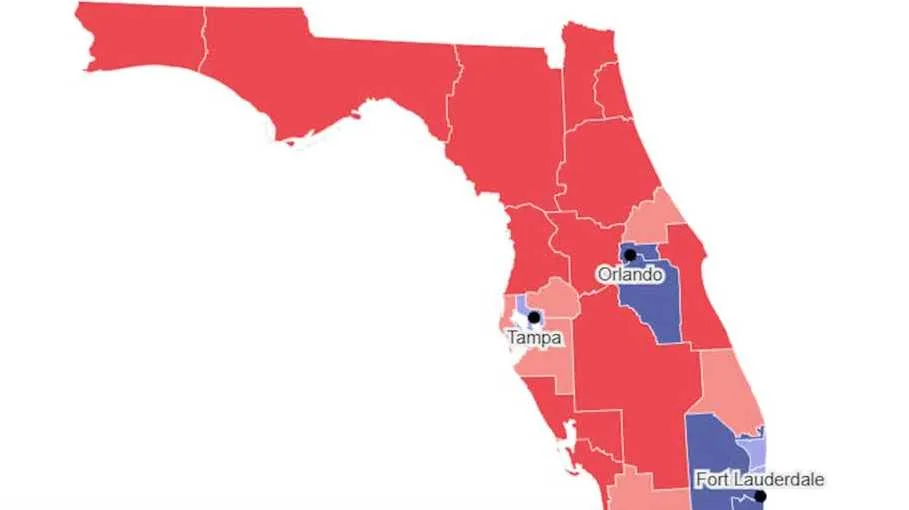
A Leon County Circuit Judge has delivered a blow to Republican Gov. Ron DeSantis, rejecting his congressional maps and ordering the legislature to redraw them. Exactly how many of the 28 districts will actually be redrawn is unclear at this point. But the lawsuit brought by the League of Women Voters, Black Voters Matter, Equal Ground, and others against the Florida House, Florida Senate, and Secretary of State Cord Byrd, focuses on the reconfiguration of north Florida congressional districts before last year’s elections. At the center of it is Democratic former Congressman Al Lawson. He’s been the voice for African Americans in north Florida since he was elected to Congress in 2016. The Republican-led legislature redrew districts, but DeSantis vetoed those maps, calling them an “illegal racial gerrymander.” He then submitted his own maps, which prompted critics to claim those maps took away African American voter representation. Since 2016, District 5, Lawson’s district, has stretched across the state line near Georgia from Tallahassee to Jacksonville. However, the new District 5 encompassed mostly Republican communities in Jacksonville. A new District 2 included Lawson’s home, but a double-digit Republican-leaning edge that he could not overcome, and he lost the November 2022 election. Now, in a ruling Saturday, Leon County Circuit Judge J. Lee Marsh sided with the plaintiffs and against the governor. In his ruling, Judge Marsh wrote, “By dismantling a congressional district that enabled Black voters to elect their candidates of choice under the previous plan, the enacted plan violates the Florida Constitution.” He further said the maps violate the Voting Rights Act. He ordered lawmakers to redraw the districts. A spokeswoman for Senate President Kathleen Passidomo said the legislature would not be making any immediate comment. An email to Byrd’s office was not returned. Neither was an email to the governor’s office. The defendants are expected to appeal to the conservative Supreme Court of Florida, where most of the justices have been appointed by DeSantis. Reacting to the judge’s ruling, Democrats call the governor’s maps part of a larger mission to disenfranchise minority voters, from school curriculums to workplace diversity training to the ballot box.“This community should be angry because he is not their governor. He does not represent them. So the Black community should be angry but to take that anger and that passion and put it into action, and that’s by voting,” Florida Democratic Party Chair Nikki Fried said. Republicans say Democrats are simply mad that they no longer have the power to draw districts to their liking, as they did before losing control of the legislature in the late 1990s. “This isn’t discrimination. This is using the power of the people who voted you into office to do what the people want you to do, which is to make districts which represent them,” former Orange County Republican Party Chair Charles Hart said. Not affected by the judge’s ruling were previous challenges to the way district lines were redrawn by the governor and Republican lawmakers in central Florida. For example, Democrat Stephanie Murphy’s District 7 in Orange and Seminole counties shifted away from Orange into Volusia County. That made it easy for Republican Cory Mills to win the seat. Although District 10 in Orange County remained strongly Democratic, its make-up changed with DeSantis’ map diluting minority voter representation and increasing the number of white Democrats in the district. An appeal to the conservative State Supreme Court is expected at any time. Some are predicting a favorable ruling by justices. A similar federal redistricting case brought by Common Cause, Fair Districts Now, and others against the Secretary of State’s office, with evidence from both sides, is due this week.
A Leon County Circuit Judge has delivered a blow to Republican Gov. Ron DeSantis, rejecting his congressional maps and ordering the legislature to redraw them. Exactly how many of the 28 districts will actually be redrawn is unclear at this point.
But the lawsuit brought by the League of Women Voters, Black Voters Matter, Equal Ground, and others against the Florida House, Florida Senate, and Secretary of State Cord Byrd, focuses on the reconfiguration of north Florida congressional districts before last year’s elections.
Advertisement
At the center of it is Democratic former Congressman Al Lawson. He’s been the voice for African Americans in north Florida since he was elected to Congress in 2016.
The Republican-led legislature redrew districts, but DeSantis vetoed those maps, calling them an “illegal racial gerrymander.”
He then submitted his own maps, which prompted critics to claim those maps took away African American voter representation.
Since 2016, District 5, Lawson’s district, has stretched across the state line near Georgia from Tallahassee to Jacksonville. However, the new District 5 encompassed mostly Republican communities in Jacksonville. A new District 2 included Lawson’s home, but a double-digit Republican-leaning edge that he could not overcome, and he lost the November 2022 election.
Now, in a ruling Saturday, Leon County Circuit Judge J. Lee Marsh sided with the plaintiffs and against the governor. In his ruling, Judge Marsh wrote, “By dismantling a congressional district that enabled Black voters to elect their candidates of choice under the previous plan, the enacted plan violates the Florida Constitution.” He further said the maps violate the Voting Rights Act.
He ordered lawmakers to redraw the districts. A spokeswoman for Senate President Kathleen Passidomo said the legislature would not be making any immediate comment. An email to Byrd’s office was not returned. Neither was an email to the governor’s office.
The defendants are expected to appeal to the conservative Supreme Court of Florida, where most of the justices have been appointed by DeSantis.
Reacting to the judge’s ruling, Democrats call the governor’s maps part of a larger mission to disenfranchise minority voters, from school curriculums to workplace diversity training to the ballot box.
“This community should be angry because he is not their governor. He does not represent them. So the Black community should be angry but to take that anger and that passion and put it into action, and that’s by voting,” Florida Democratic Party Chair Nikki Fried said.
Republicans say Democrats are simply mad that they no longer have the power to draw districts to their liking, as they did before losing control of the legislature in the late 1990s.
“This isn’t discrimination. This is using the power of the people who voted you into office to do what the people want you to do, which is to make districts which represent them,” former Orange County Republican Party Chair Charles Hart said.
Not affected by the judge’s ruling were previous challenges to the way district lines were redrawn by the governor and Republican lawmakers in central Florida. For example, Democrat Stephanie Murphy’s District 7 in Orange and Seminole counties shifted away from Orange into Volusia County. That made it easy for Republican Cory Mills to win the seat.
Although District 10 in Orange County remained strongly Democratic, its make-up changed with DeSantis’ map diluting minority voter representation and increasing the number of white Democrats in the district.
An appeal to the conservative State Supreme Court is expected at any time. Some are predicting a favorable ruling by justices.
A similar federal redistricting case brought by Common Cause, Fair Districts Now, and others against the Secretary of State’s office, with evidence from both sides, is due this week.


